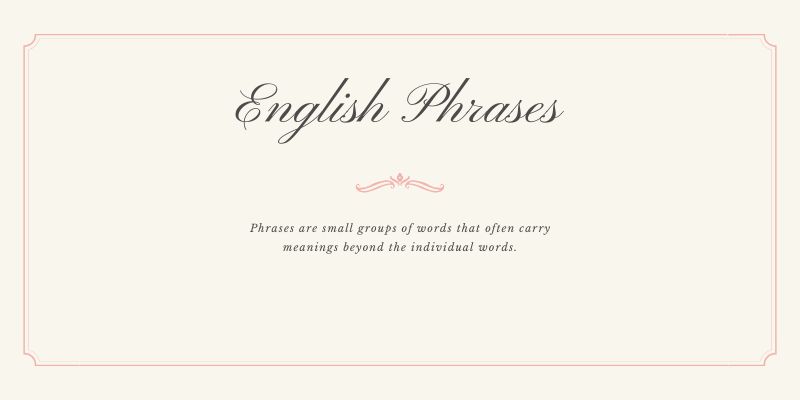Table of Contents
- 1 Phrases in English
- 1.1 Why Learn English Phrases?
- 1.1.1 1. Basic English Phrases for Greetings
- 1.1.2 2. Phrases for Small Talk
- 1.1.3 3. Asking for Help or Information
- 1.1.4 4. Phrases for Shopping and Restaurants
- 1.1.5 5. Expressing Opinions
- 1.1.6 6. Phrases for Expressing Feelings
- 1.1.7 7. Making Plans
- 1.1.8 8. Common Phrases for Work or School
- 1.1.9 9. Phrases for Emergencies or Important Situations
- 1.1.10 10. Ending Conversations Politely
- 1.2 How to Learn and Remember These Phrases
- 1.3 Bonus Tip: Group Phrases by Situation
- 1.4 Conclusion
- 1.1 Why Learn English Phrases?
Phrases in English
If you learn English, you should know that grammar and vocabulary are important, but sentences are the ones that make your interaction natural and fluid. In this blog post, we will discover 50 useful English sentences for everyday conversations. These sentences are usually used by mother tongue speakers in random and formal situations. By learning and using them, you will create more confidence and fluid sound in English.

Why Learn English Phrases?
Learning personal words is useful, but sentences allow you to express yourself naturally. A phrase is a group of words that work together to express a meaning – sometimes different from the literal meaning of each word. When you learn useful sentences:
You improve the flow and consider the conversation better. You look more natural and humble, and get the confidence to talk.
Whether you are a student, professional or passenger, these sentences will help you in real-life situations.
1. Basic English Phrases for Greetings
1. Hello! How are you? – A humble and friendly greeting.
2. Nice to meet you. – Use it when you meet someone for the first time.
3. Good morning/afternoon/evening. -The time-based greetings.
4. How are you doing? – This is a random way to ask how someone is.
5. What’s going on? – Informal greetings between friends.
2. Phrases for Small Talk
6. This is a beautiful day, right? – To start the conversation.
7. How was your weekend? – A favourable way to investigate.
8. I’ve heard a lot about you. – To meet someone new.
9. Long time no see! – When you meet someone after a long time.
10. What do you do for a living? – To ask about someone’s job.
3. Asking for Help or Information
11. Can you help me?
12. Do you know where the closest ATM is?
13. Can you repeat that, please?
14. How do I reach the airport?
15. What does this word mean?
These are very useful for passengers or beginners who are still learning from a teacher.
4. Phrases for Shopping and Restaurants
16. How much does this cost?
17. Do you accept credit cards?
18. Can I try it on? – in a clothing store.
19. I will order chicken, please. – At a restaurant.
20. Can I get a bill/check?
5. Expressing Opinions
21. I think this is a good idea.
22. In my opinion …
23. I agree with you
24. I’m not sure about this.
25. This is a good thing.
6. Phrases for Expressing Feelings
26. I am very happy for you!
27. He’s fantastic!
28. I’m sorry to hear that. – When someone shares bad news.
29. I’m a little tired today.
30. I’m excited about this occasion.
7. Making Plans
31. Are you free this weekend?
32. Let’s catch up soon.
33. What about dinner on Friday?
34. I like it
35. I’ll get back to you.
8. Common Phrases for Work or School
36. Let’s get started.
37. Can you send me a report?
38. This is not my responsibility.
39. I want to take care of it.
40. I’ve been going for a while.
They are especially useful in professional and academic surroundings.
9. Phrases for Emergencies or Important Situations
41. Call the police!
42. I need a doctor.
43. It’s an emergency!
44. My wallet is lost.
45. Can you talk slowly?
10. Ending Conversations Politely
46. It was nice to talk to you.
47. I’ll see you later.
48. Take care of yourself!
49. Have a good day!
50. Let’s stay in touch.
How to Learn and Remember These Phrases
Here are some suggestions to master these English sentences:
Use flashcards – write the phrase on the flashcard and see it every day.
Practice talking – use them in real conversation or with a speaking partner.
Watch English movies – notice how the mother tongue uses these sentences.
Repeat vigorously – to say them out loud. It improves pronunciation and memory.
Write short dialogues – practice these sentences in written conversation.
Bonus Tip: Group Phrases by Situation
If you meet them with reference, the sentences are easy to remember – for example, journey, job interviews, restaurant visits, etc.
For example:
If you travel: Focus on directions, transport and food-related sentences.
If you are looking for a job, Practice interviews and restart the related sentences.
Conclusion
Mastery of these 50 useful English sentences will improve your communication skills. Whether you are a beginning or an intermediate student, these expressions are crucial for daily conversation, travel, work and social life. Continue to practice, and soon you will find yourself speaking English more fluently and confidently.
Bookmark this page or print the list to review The Daily. Do you want more? Stick to our upcoming blog posts on advanced sentences, design language and phrasal actions.